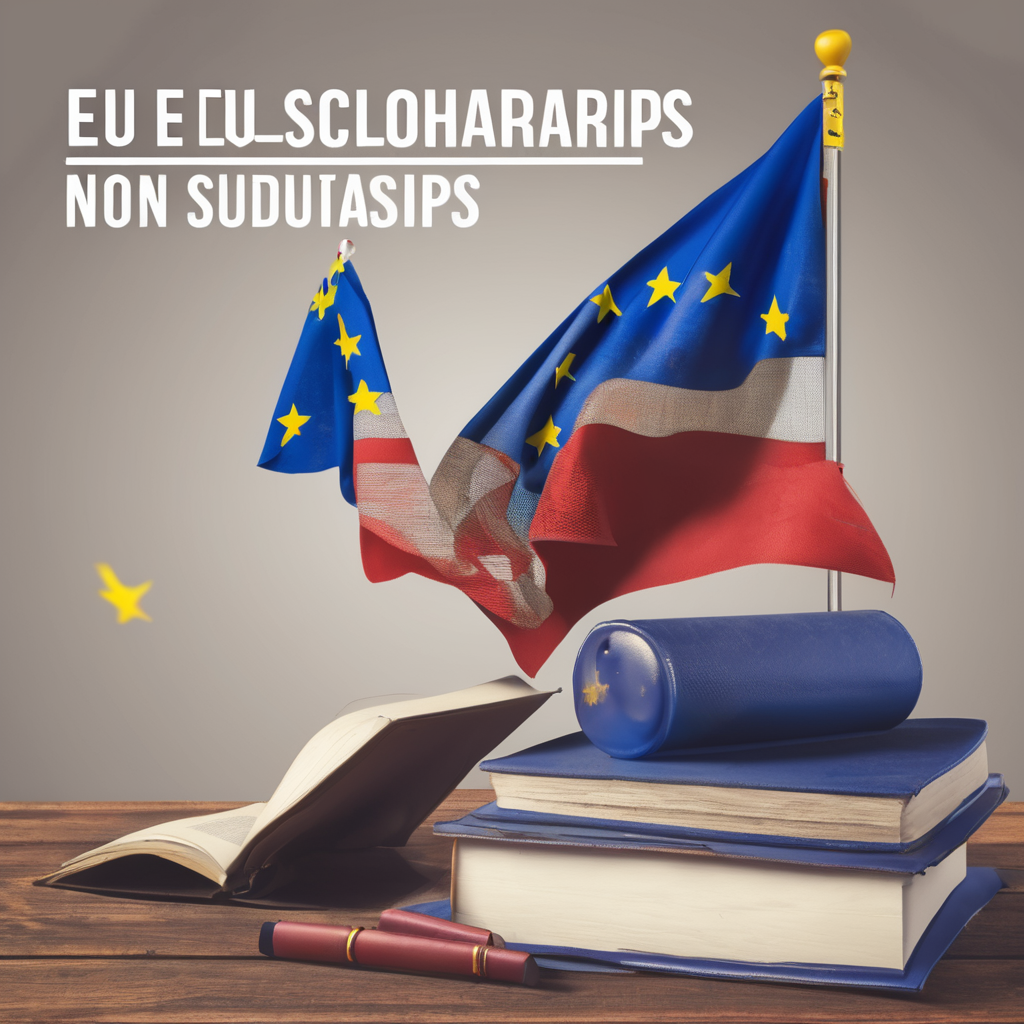
A guide to EU scholarships for non-EU students
- Table of Contents
“Unlock Europe: Your Gateway to EU Scholarships for Global Scholars”
Introduction
Navigating the landscape of higher education can be a daunting task, especially for non-EU students looking to study in Europe. The European Union offers a plethora of scholarship opportunities aimed at attracting a diverse range of international students to its member countries. These scholarships not only help mitigate the financial burdens associated with studying abroad but also promote cultural exchange and educational diversity within the EU. This guide provides an overview of the various EU scholarships available to non-EU students, detailing eligibility criteria, application processes, and the benefits of each program. Whether you are seeking to undertake undergraduate, postgraduate, or doctoral studies, understanding the scope of EU scholarships can significantly enhance your educational journey.
Overview Of EU Scholarship Programs For Non-EU Students
The European Union (EU) offers a plethora of scholarship opportunities aimed at fostering educational exchange and cultural understanding, which are accessible to students from outside the EU. These scholarships not only provide financial assistance but also contribute to the development of a global network of knowledge and skills. Understanding the landscape of these scholarships can be a stepping stone for non-EU students aspiring to study in one of the world’s leading educational hubs.
One of the flagship initiatives is the Erasmus+ program, which is renowned for its comprehensive support for education, training, youth, and sport in Europe. Erasmus+ not only caters to EU citizens but is also open to non-EU students. This program provides scholarships for a range of activities including master’s degree programs, part of doctoral programs, and internships. The scholarships cover tuition, a living allowance, and travel costs, thereby easing the financial burden on international students.
Furthermore, the European Commission collaborates with various countries and regions outside the EU to offer tailored scholarship programs that align with specific educational and policy objectives. For instance, the Intra-Africa Academic Mobility Scheme enables students from African countries to study in the EU. This initiative supports academic cooperation between higher education institutions in Africa and the EU, enhancing the educational experiences of the students involved.
Additionally, individual EU countries also offer their own scholarships targeted at international students. For example, the German Academic Exchange Service (DAAD) provides a wide range of scholarships for non-EU students to study at German universities at various academic levels. Similarly, the French government offers the Eiffel Excellence Scholarship Program to attract top foreign students to enroll in master’s and PhD courses at French institutions.
The criteria for eligibility and the application process for these scholarships can vary significantly. Generally, they depend on the specific program and the partnership between the EU and the student’s home country. Most scholarships require a demonstration of academic excellence, language proficiency, and sometimes specific qualifications related to the student’s chosen field of study. It is crucial for prospective applicants to thoroughly research and understand the eligibility requirements and to prepare their application materials well in advance of deadlines.
Moreover, the benefits of these scholarships extend beyond mere financial assistance. They are designed to provide a comprehensive educational experience that includes cultural exchange, professional networking, and often language acquisition. Participating in these programs allows students to gain a deeper understanding of European cultures and societies, which is invaluable in today’s globalized world.
In conclusion, EU scholarships for non-EU students offer more than just an opportunity to study abroad; they are a gateway to personal and professional development. These programs are instrumental in building cross-cultural bridges and equipping students with the skills necessary to contribute to global challenges. Prospective students are encouraged to leverage these opportunities to not only enhance their educational qualifications but also to enrich their life experiences. By doing so, they can play a part in the larger narrative of global educational exchange and cooperation fostered by the European Union.
How To Apply For EU Scholarships: A Step-By-Step Guide
Applying for scholarships within the European Union (EU) as a non-EU student can be a transformative opportunity to advance your education and experience diverse cultures. The process, while meticulous, opens doors to numerous educational benefits, and understanding the step-by-step application can significantly enhance your chances of success.
The first step in applying for EU scholarships is to identify the programs that align with your academic interests and career goals. The EU offers a variety of scholarships across multiple disciplines, each with its own set of criteria and objectives. Websites like the European Commission’s Education, Audiovisual and Culture Executive Agency (EACEA) provide comprehensive lists of available scholarships, including popular programs like Erasmus+, which offers opportunities for study, training, and internships across Europe. Thorough research will help you find a scholarship that not only fits your academic profile but also offers the specific benefits you are seeking, such as full tuition coverage, living stipends, or travel allowances.
Once you have selected the appropriate scholarships, the next crucial step is to carefully review the eligibility requirements. EU scholarships typically have strict criteria, which may include academic achievements, language proficiency, and specific qualifications related to the field of study. Ensuring that you meet these requirements is essential before proceeding with your application. This stage often requires gathering documents such as transcripts, proof of language proficiency, and letters of recommendation. It’s advisable to start this process early, as obtaining certain documents can be time-consuming.
After assembling all necessary documentation, the actual application process begins. Most scholarship applications require filling out an online form, where you will input your personal information, educational background, and professional experience. This is also where you’ll upload the required documents. Pay close attention to the instructions provided by the scholarship program, as even small errors in the application form can lead to disqualification. Additionally, some scholarships might require a motivational letter or a research proposal, depending on the nature of the program. These documents should be crafted carefully, clearly articulating your passion, your academic and professional objectives, and how the scholarship will help you achieve these goals.
Another important aspect of the application process is adhering to deadlines. EU scholarship deadlines are strict, and missing a deadline can mean missing out on an entire academic year. Mark these dates on your calendar and set reminders to ensure that all parts of your application are completed and submitted on time.
Finally, after submitting your application, the waiting period begins. This can vary widely depending on the scholarship. During this time, it’s wise to keep yourself occupied and perhaps prepare for potential interviews. Some scholarships require interviews either in person or online as part of the selection process. Preparing for these interviews by reviewing your application and practicing potential questions can be very beneficial.
In conclusion, applying for EU scholarships requires a well-organized approach starting from thorough research to careful preparation of application materials, and strict adherence to deadlines. Each step, when executed carefully, not only brings you closer to securing financial aid but also to experiencing the rich academic and cultural diversity of Europe. Remember, the effort you put into your scholarship applications can open up a world of opportunities that extends far beyond your studies.
Top EU Universities Offering Scholarships For International Students
Europe has long been a hub for academic excellence, attracting students from around the globe with its rich history, diverse cultures, and outstanding universities. For non-EU students seeking educational opportunities without the burden of high tuition fees, numerous top-tier EU universities offer scholarships that not only alleviate financial concerns but also provide a gateway to world-class education.
One of the most prestigious institutions, the University of Oxford in the United Kingdom, offers the Clarendon Fund Scholarships aimed at graduate students. These scholarships cover tuition and college fees in full and provide a generous grant for living expenses. Oxford seeks to attract the best and brightest international students, and the Clarendon Fund is a testament to this commitment, focusing on academic excellence and potential across all degree-bearing subjects.
Moving to the Nordic countries, the University of Helsinki in Finland is another prime destination for international students. Known for its research-led education, the university offers a range of scholarships under its Helsinki Scholarship Programme. These scholarships are targeted at talented non-EU/EEA students who are required to pay tuition fees and cover either 50% or 100% of the tuition, with some even offering an additional living cost grant.
In the Netherlands, Delft University of Technology stands out with its Justus & Louise van Effen Excellence Scholarships, which are specifically designed for international students wishing to pursue a Master’s degree at the university. These scholarships cover full tuition fees and provide a monthly allowance for living expenses, making it an attractive option for those looking to specialize in engineering and technology.
Germany, known for its no-tuition-fee policy for undergraduates, extends its generosity to postgraduate international students through various scholarship programs. The DAAD Scholarships, for instance, are available to students from all disciplines and include a monthly stipend, travel allowance, and insurance, facilitating a smooth academic journey in numerous German universities.
France, too, offers substantial support for international students through initiatives like the Eiffel Excellence Scholarship Programme. Managed by Campus France, these scholarships are intended for master’s and PhD students and cover various expenses including a monthly allowance, travel, health insurance, and cultural activities. This program is particularly appealing for those looking to immerse themselves in French culture and academic life.
Transitioning to the southern part of Europe, Italy’s government scholarships for international students provide opportunities at various public institutions. These scholarships help cover tuition fees and living costs and are available for a range of study levels from undergraduate to PhD. Universities like the University of Bologna have specific scholarship programs aimed at fostering an international student community and promoting academic excellence.
Lastly, the Central European University in Hungary offers a comprehensive scholarship program covering tuition, health insurance, and a living stipend for students at all study levels. Known for its strong emphasis on social sciences, CEU is an ideal choice for students interested in these fields looking to study in a vibrant, multicultural environment.
In conclusion, the European Union boasts a plethora of universities that not only provide high-quality education but also offer generous scholarships to attract talented non-EU students. These scholarships not only ease the financial burden but also enrich the educational experience by fostering a diverse and inclusive academic community. Aspiring students should thoroughly research and take advantage of these opportunities to propel their academic and professional careers on an international stage.
Success Stories: Non-EU Students Who Have Benefited From EU Scholarships
The European Union (EU) has long been a beacon of educational excellence, attracting students from around the globe with its diverse range of high-quality academic institutions and rich cultural heritage. For non-EU students, the allure of studying in Europe is often coupled with the financial support offered through various EU scholarships, which have opened doors to countless individuals seeking to enhance their knowledge and skills in an international setting. The success stories of these students not only highlight the transformative impact of such scholarships but also serve as a testament to the EU’s commitment to fostering global educational exchange.
One notable example is that of Amara, a student from Kenya who received the Erasmus Mundus Joint Master Degree (EMJMD) scholarship. This prestigious scholarship enabled her to pursue a master’s degree in Environmental Sciences at universities in both Spain and Denmark. The financial support covered her tuition fees, travel costs, and living expenses, allowing her to focus entirely on her studies. Amara’s academic journey in Europe exposed her to advanced research facilities and an international network of experts in her field. After completing her degree, she returned to Kenya, where she has been instrumental in developing sustainable agricultural practices that are now being adopted by local farmers.
Similarly, Raj from India benefited from the Marie Skłodowska-Curie Actions (MSCA), a program designed to support research at all stages of a scientist’s career. Raj’s project focused on renewable energy technologies, and through his scholarship, he was able to join a research team in Germany. The MSCA not only provided him with the necessary financial backing but also offered him opportunities to attend international conferences and workshops, enhancing his visibility in the research community. Raj’s work has contributed significantly to advancements in solar energy, and he has published several influential papers in top scientific journals.
Another inspiring story comes from Elena, a young architect from Argentina who received a scholarship under the Horizon Europe program. Her scholarship allowed her to be part of a collaborative project between universities in Italy and the Netherlands, focusing on sustainable urban development. The experience not only broadened her technical and creative skills but also deepened her understanding of European architectural styles and urban planning principles. Elena’s exposure to diverse methodologies and ideas has enriched her approach to architecture, making her a sought-after professional in her home country.
These stories are just a few examples of how EU scholarships are making a significant difference in the lives of non-EU students. By providing financial support and access to a wide array of educational resources, the EU is playing a crucial role in shaping the next generation of global leaders and innovators. Moreover, the success of these individuals upon returning to their home countries underscores the ripple effect of such scholarships, as they apply and share their newly acquired knowledge and skills to benefit their local communities.
The EU continues to expand and enhance its scholarship offerings, reflecting its ongoing commitment to educational and cultural exchange. For non-EU students aspiring to study in Europe, these scholarships represent not just a financial aid but a gateway to personal and professional development. The stories of Amara, Raj, and Elena illustrate the profound impact that EU scholarships can have, not only on the recipients themselves but also on the broader global community. As more students from around the world benefit from these opportunities, the legacy of EU scholarships will undoubtedly continue to grow, fostering a more interconnected and educated world.



